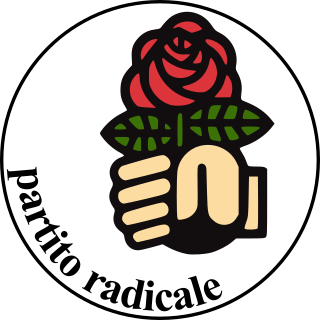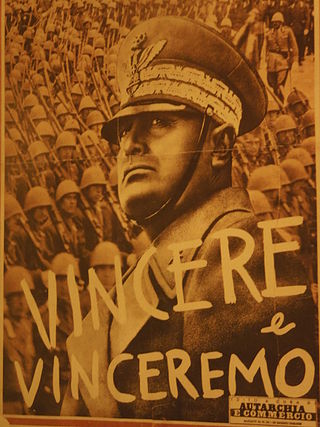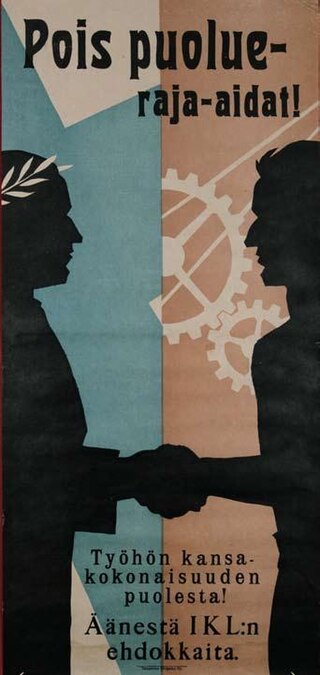
Fascism is a far-right, authoritarian, ultranationalist political ideology and movement, characterized by a dictatorial leader, centralized autocracy, militarism, forcible suppression of opposition, belief in a natural social hierarchy, subordination of individual interests for the perceived good of the nation or race, and strong regimentation of society and the economy.

Christian Democracy was a Christian democratic political party in Italy. The DC was founded on 15 December 1943 in the Italian Social Republic as the nominal successor of the Italian People's Party, which had the same symbol, a crusader shield. As a Catholic-inspired, centrist, catch-all party comprising both centre-right and centre-left political factions, the DC played a dominant role in the politics of Italy for fifty years, and had been part of the government from soon after its inception until its final demise on 16 January 1994 amid the Tangentopoli scandals. Christian Democrats led the Italian government continuously from 1946 until 1981. The party was nicknamed the "White Whale" due to its huge organisation and official colour. During its time in government, the Italian Communist Party was the largest opposition party.
Neo-fascism is a post–World War II far-right ideology that includes significant elements of fascism. Neo-fascism usually includes ultranationalism, racial supremacy, populism, authoritarianism, nativism, xenophobia, and anti-immigration sentiment, as well as opposition to liberal democracy, social democracy, parliamentarianism, liberalism, Marxism, capitalism, communism, and socialism. As with classical fascism, it proposes a Third Position as an alternative to market capitalism.

The National Front (NF) is a far-right, fascist political party in the United Kingdom. It is currently led by Tony Martin. A minor party, it has never had its representatives elected to the British or European Parliaments, although it gained a small number of local councillors through defections and it has had a few of its representatives elected to community councils. Founded in 1967, it reached the height of its electoral support during the mid-1970s, when it was briefly England's fourth-largest party in terms of vote share.

The Radical Party was a liberal and libertarian political party in Italy.
The Communist Workers' Party (CWP) was a far-left Maoist group in the United States. It had its origin in 1973 as the Asian Study Group established by Jerry Tung, a former member of the Progressive Labor Party (PLP) who had grown disenchanted with the group and disagreed with changes taking place in the party line. The party is mainly remembered as being associated with victims of the Greensboro Massacre of 1979.

The Italian Liberal Party was a liberal political party in Italy.

Giorgio Almirante was an Italian politician who founded the neo-fascist Italian Social Movement, which he led until his retirement in 1987.

The history of fascist ideology is long and it draws on many sources. Fascists took inspiration from sources as ancient as the Spartans for their focus on racial purity and their emphasis on rule by an elite minority. Fascism has also been connected to the ideals of Plato, though there are key differences between the two. Fascism styled itself as the ideological successor to Rome, particularly the Roman Empire. From the same era, Georg Wilhelm Friedrich Hegel's view on the absolute authority of the state also strongly influenced fascist thinking. The French Revolution was a major influence insofar as the Nazis saw themselves as fighting back against many of the ideas which it brought to prominence, especially liberalism, liberal democracy and racial equality, whereas on the other hand, fascism drew heavily on the revolutionary ideal of nationalism. The prejudice of a "high and noble" Aryan culture as opposed to a "parasitic" Semitic culture was core to Nazi racial views, while other early forms of fascism concerned themselves with non-racialized conceptions of the nation.

The Common Man's Front, also translated as Front of the Ordinary Man, was a short-lived right-wing populist, monarchist and anti-communist political party in Italy. It was formed shortly after the end of the Second World War and participated in the first post-war election for the constituent assembly in 1946. Its leader was the Roman writer Guglielmo Giannini, and its symbol was the banner of Giannini's newspaper L'Uomo qualunque.

Fascist movements in Europe were the set of various fascist ideologies which were practiced by governments and political organizations in Europe during the 20th century. Fascism was born in Italy following World War I, and other fascist movements, influenced by Italian Fascism, subsequently emerged across Europe. Among the political doctrines which are identified as ideological origins of fascism in Europe are the combining of a traditional national unity and revolutionary anti-democratic rhetoric which was espoused by the integral nationalist Charles Maurras and the revolutionary syndicalist Georges Sorel.

The Legislature VII of Italy was the 7th legislature of the Italian Republic, and lasted from 5 July 1976 until 19 June 1979. Its composition was the one resulting from the general election of 20 June 1976.

The Italian Social Movement was a neo-fascist political party in Italy. A far-right party, it presented itself until the 1990s as the defender of Italian fascism's legacy, and later moved towards national conservatism. In 1972, the Italian Democratic Party of Monarchist Unity was merged into the MSI and the party's official name was changed to Italian Social Movement – National Right.
Post-fascism is a label that identifies political parties and movements that transition from a fascist political ideology to a more moderate and mainline form of conservatism, abandoning the totalitarian traits of fascism and taking part in constitutional politics.

Giovanni Roberti was an Italian politician.

Eurocommunism was a trend in the 1970s and 1980s within various Western European communist parties, which said they had developed a theory and practice of social transformation more relevant for Western Europe. During the Cold War, they sought to reject the influence of the Soviet Union and its communist party. The trend was especially prominent in Italy, Spain, and France.

Fascist syndicalism was an Italian trade syndicate movement that rose out of the pre-World War II provenance of the revolutionary syndicalist movement led mostly by Edmondo Rossoni, Sergio Panunzio, Angelo Oliviero Olivetti, Michele Bianchi, Alceste De Ambris, Paolo Orano, Massimo Rocca, and Guido Pighetti, under the influence of Georges Sorel, who was considered the "'metaphysician' of syndicalism". The fascist syndicalists differed from other forms of fascism in that they generally favored class struggle, worker-controlled factories and hostility to industrialists, which lead historians to portray them as "leftist fascist idealists" who "differed radically from right fascists." Generally considered one of the more radical fascist syndicalists in Italy, Rossoni was the "leading exponent of fascist syndicalism", and sought to infuse nationalism with "class struggle".














